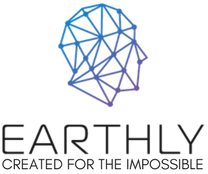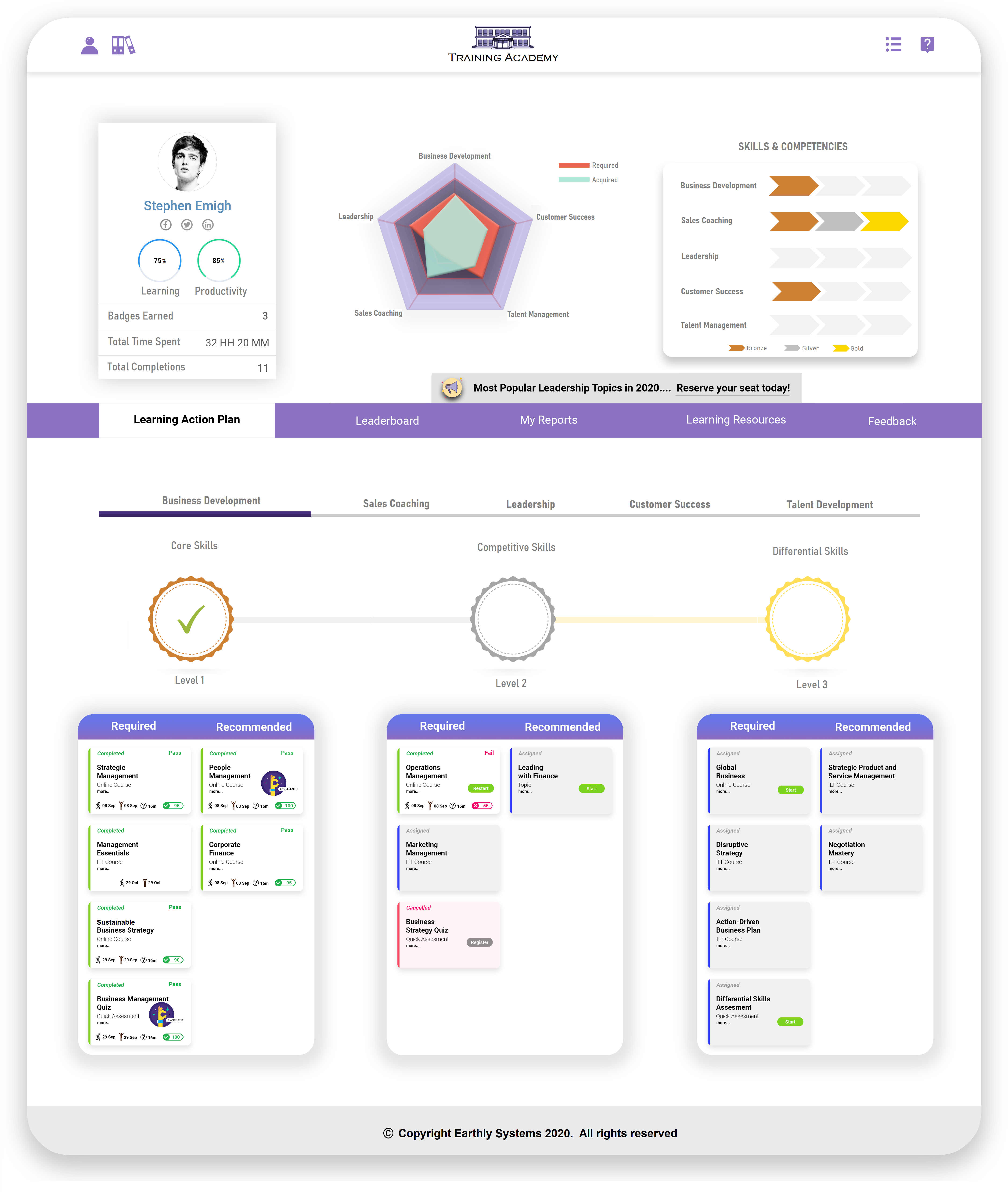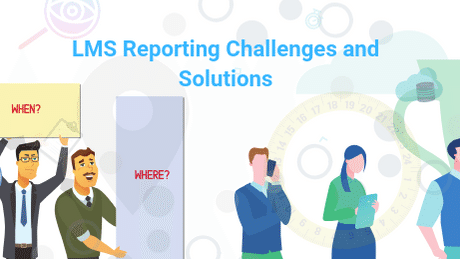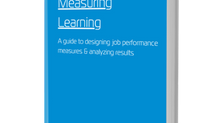6 Ways a Sales Learning Dashboard Can Drive Sales Success
Jan 31, 2020
You’ve hired the best sales team and created a top-notch training experience. Now it’s time to use the information and analytics you already have to help your team live up to their potential and meet sales goals on a consistent basis. Here are six reasons why a learning dashboard is the missing piece of your performance puzzle.
Nothing happens until something gets sold
Sales is the life blood of any organization. A strong sales pipeline is more than a revenue stream – it’s the foundation for your ongoing success. Keeping your salespeople in sync with the needs of your customers and your company is a key element of sales success.
Yet in today’s business climate, staying on track for the long run can be a challenge. How do you track results and drive motivation in a way that keeps your sales team both engaged and focused? Start by mining your training programs and learning management system (LMS) for the data you need to build a learning dashboard.
What is a learning dashboard?
A learning dashboard is an information management tool that tracks a variety of metrics relevant to learning, job performance, development goals, or business strategies. A dashboard aggregates information and displays results in an easy-to-understand graphical format.
A learning dashboard may include several different types of data, including:
- Operational information, such as training assignment completion and learning goals;
- Strategic information, such as training KPIs and personal development goals; and
- Analytical information, such as team performance and individual learning results or rankings.
Learning dashboards typically provide several different types of views. The individual view allows users to track their progress towards completion of their individual learning goals. A team view provides people leaders with the ability to track the learning progress for each of their direct reports and to compare or contrast overall performance against other peer teams. The leadership view allows learning leaders to view results across the global learning population.
Sales learning dashboards versus sales management dashboards: how do they compare?
Sales management dashboards provide valuable information about the status and expected results of your current sales pipeline. Sales management dashboards are outcome-focused by nature, so they tell you what’s happening in terms of activity and revenue.
But what if your sales activity is not producing the expected results? A sales management dashboard usually cannot tell you why your sales team is not producing results, because it does not focus on the sales input process.
A sales learning dashboard, on the other hand, tracks the knowledge and training activities that support your organization’s sales process. When you’re not seeing the kinds of sales results you expect, look to your sales learning dashboard to see the knowledge and performance gaps need to be filled.
Let’s look at the six ways a sales learning dashboard can help improve your sales team’s skill set.
- A sales learning dashboard enables real-time training results
Successful organizations constantly try to change for the better.
The best salespeople know that training is an ongoing process. Salespeople can use their learning dashboard to confirm that they are always up-to-date on the knowledge and skills they need to do their job. People leaders can use their team view in the learning dashboard to view the overall learning journey for each of their direct reports.
Real-time reporting helps to ensure that benchmarks for new hires are met and that compliance goals are achieved.
- A sales learning dashboard motivates sales performance
Add gamifying elements to your learning dashboard by creating a leader board and assigning a score to various learning tasks. For example, you could track completions by date and award those users who were first to pass a course. Turn knowledge based assessments into games or activities and stack-rank your player participants according to level of difficulty, job role, team, or location.
Salespersons are competitive by nature. Transforming learning from a task to a game helps to show your team members how to leverage their knowledge and skills for a win!
- A sales learning dashboard validates the quality of your overall learning program
High quality sales training programs don’t happen overnight; they’re usually the result of years of experience gained through trial and error. Still, there’s no sure-fire recipe for sales training success. What worked last year may fall flat this year.
Sales learning dashboards can help you find the right recipe for learning success. Compare real-world results to the learning activities for each job role to see how well your training programs align with your sales goals. View this data across teams or locations for a big-picture view of your program success and track it over time to get an idea of the “life expectancy” of your overall learning program.
- A sales learning dashboard can identify trends and find gaps
Learning results tend to vary over time, and a learning dashboard can help you figure out why something works – or not.
A major change in learning results or performance outcomes can be a signal that your training program needs attention. Are your new hires doing a lot better than expected? You may be hiring at a stronger skill level – or perhaps your existing training is out-of-date and a bit to easy. If performance is much worse than expected, your training program could be out of line with your current needs. Take a moment to review your current job descriptions, KPIs, sales goals, and strategies. Use this information to find and fill in gaps that may have appeared in your existing programs.
- A sales learning dashboard motivates personal development and skills growth
This is one of the biggest benefits for your end users.
A sales learning dashboard offers more than just a “where am I today” snapshot of each user’s progress on assigned training. Add a personal development tab to your dashboard so that each learner can zero in on the knowledge and skills they need to develop to advance their career.
Make it a policy to allow your salespeople time to complete both the job-essential training courses they have to take as well as the personal development courses they want to take. Providing this balance will ensure that your people have an enjoyable and engaging experience with learning.
- A learning dashboard links learning and performance
A learning dashboard is the logical place to connect, analyze and link learning and performance results together. Your LMS can provide relevant data sets for learning; performance and customer data can be imported from a CRM (such as Salesforce). Over time, you can use predictive analytics to link performance results back to the learning activities that support each skill or KPI.
What does a sales learning dashboard include?
The look, feel, and functionality of a sales learning dashboard is customized to meet the specific needs of an organization. Common elements of a sales learning dashboard typically include:
- Curriculum structure, training categories, training levels, and type of training
- Overview of learning program and curriculum structure
- Details of all courses a learner is registered for
- Status of all learning activities, completions, badges, and rankings
- Personal development activities
- Business outcomes
Building a sales dashboard from scratch will require a bit of planning and preparation. A good way to start is by familiarizing yourself with the kinds of data and reporting functions that your current LMS setup provides. Once you know your capabilities, it’s just a matter of figuring out what information you need.
The graphic below offers a high level overview of the dashboard creation process.
Ask Earthly
Earthly Systems, your LMS professional services partner, has created the Accelerate Sales Learning Dashboard. Accelerate provides a comprehensive view of your learning program, detailed reporting, and customized views for learners, people leaders, and learning executives.
Contact us today to schedule a presentation or to learn how we can work with you to design the perfect learning dashboard for your organization.




